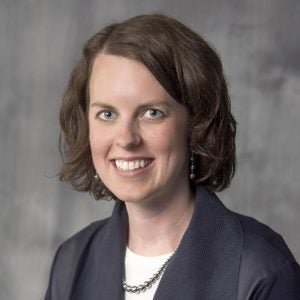URI professor serves on AARP roundtable to create framework for intergenerational education
Higher education isn’t only for those at the cusp of their careers, trying to establish themselves in a particular profession. Increasingly, older adults finished with their careers are interested returning to the classroom, and a university of Rhode Island professor recently served on a committee aimed at increasing age inclusivity at colleges and universities.
Skye Leedahl, an associate professor in the Department of Human Development and Family Studies, recently served on an academic roundtable hosted by the AARP, the largest interest group representing older adults in the country. The roundtable brought together experts from higher education institutions around the country to discuss creating “a framework colleges and universities can use to make intergenerational communities of learning a priority.” The participants brainstormed ways to make higher education more inclusive to older adults.
“In many cases, education has to be done differently for older adults,” Leedahl said. “Their learning style is more incremental, more hands-on; it needs to be connected to what they want to learn. Just thinking let’s just plunk older adults into our current classrooms would be a missed opportunity. I think it needs to be much more thoughtful about what their learning styles and preferences are.”
In several breakout sessions during the October meeting in Washington, D.C., the group came up with new program ideas to increase options in higher education for older adults. Some potential offerings include an expansion of intergenerational programs like Cyber Seniors — a program Leedahl and Pharmacy Professor Erica Estus direct at URI — new certificate programs for older students who may not want to engage in a full degree program, and workforce retraining programs for those looking for a change after a long career.
“One of the big things that was talked about was the first steps to make this all happen — how to communicate this to higher education administrators,” Leedahl said. “We need to put together data and have a really solid presentation so higher education administrators get on board. Show them why these changes are needed.”
One reason they are needed should appeal directly to higher education administrators — money. Colleges and universities across the country are bracing for a demographic cliff brought on during the Great Recession, when the birth rate in the country dropped significantly. The 2020s is shaping up to be a challenging decade for higher education, which will see fewer students of traditional college age than in the past.
“There are predictions that some colleges and universities are going to have to shut down because they are going to have such lower enrollment in traditional age students that they won’t be able to keep up. There’s just not going to be enough students to keep everybody afloat, essentially,” Leedahl said. “When push comes to shove, what higher education needs is paying students. So if it’s not going to be your traditional age students, then maybe it can be the older population in some way, shape or form.”
Leedahl has a head start in engaging the older generation, having directed URI’s Cyber Seniors program along with Estus. The pair sends students into the community to engage directly with older adults. Meeting weekly at senior centers and assisted living facilities in eight communities from Pawtucket to Narragansett, the students help teach technology to older adults. The clients often bring their devices to the students, asking for help in how to use them. Others want to learn how to use Facebook to communicate with friends and family, post a resume online and search for a new job, even develop a personal website or blog.
There is also a social component to the program as both parties get a lesson in intergenerational communication.
“There is great value for health and human services students by gaining these communication skills,” Leedahl said. “Eventually, they’re going to be walking them through how to get their benefits, talking about whether they should enroll in long-term care or should they be in assisted living. If they’re able to communicate with an older person about technology, they can certainly help them later with some of these more difficult decisions. Like my pharmacy colleague says, if you can tell an older person how to use an iPhone, you can certainly explain Lipitor to them.”
Cyber Seniors can also be a platform to prepare higher education for an influx of older adults.
“Higher education institutions need to try to engage the baby boomer generation in higher education activities,” Leedahl said. “Maybe it isn’t to start a new major; maybe it’s to take a few classes. Maybe we need to come up with a new certificate program. We’re trying to be creative in how we engage this population.”

